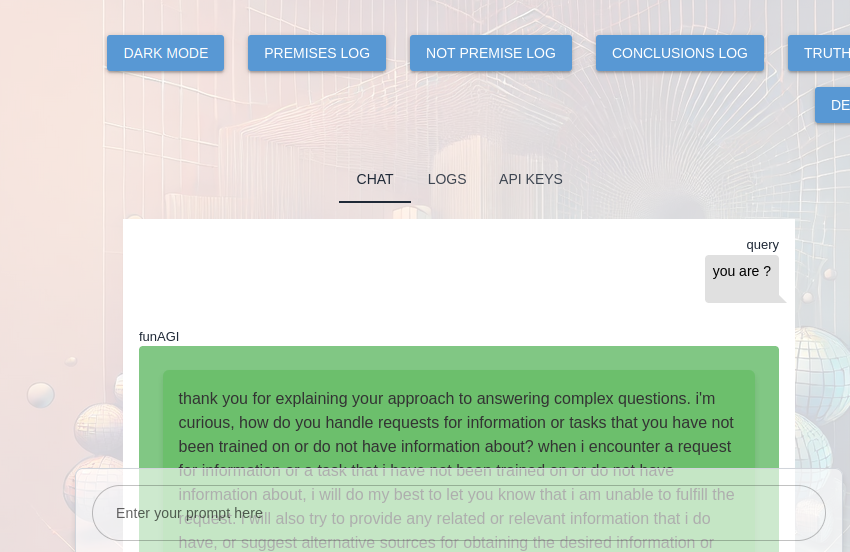Overview
The LogicTables module is designed to handle logical expressions, variables, and truth tables. It provides functionality to evaluate logical expressions, generate truth tables, and validate logical statements. The module also includes logging mechanisms to capture various events and errors, ensuring that all operations are traceable.
Class LogicTables
Attributes
variables: A list to store the variables involved in logical expressions.expressions: A list to store the logical expressions to be evaluated.valid_truths: A list to store expressions that have been validated as true.logger: A logging object to capture and store log messages.
def __init__(self):
self.variables = []
self.expressions = []
self.valid_truths = []
self.logger = logging.getLogger('LogicTables')
self.logger.setLevel(logging.DEBUG) # Set to DEBUG to capture all logs
Upon initialization, the LogicTables class sets up logging mechanisms and ensures that necessary directories for logs are created.
Logging Methods
def log(self, message, level='info'):
if level == 'info':
self.logger.info(message)
elif level == 'error':
self.logger.error(message)
elif level == 'warning':
self.logger.warning(message)
self.store_log_in_mindx(message, level)
self.store_log_in_memory(message, level)
def store_log_in_mindx(self, message, level):
general_log_path = './mindx/errors/log.txt'
pathlib.Path(general_log_path).parent.mkdir(parents=True, exist_ok=True)
with open(general_log_path, 'a') as file:
file.write(f"{level.upper()}: {message}\n")
def store_log_in_memory(self, message, level):
memory_log_path = './memory/truth/logs.txt'
pathlib.Path(memory_log_path).parent.mkdir(parents=True, exist_ok=True)
with open(memory_log_path, 'a') as file:
file.write(f"{level.upper()}: {message}\n")
The logging methods ensure that messages are logged both to the general log file and the memory log file
Adding Variables and Expressions
def add_variable(self, var):
if var not in self.variables:
self.variables.append(var)
self.log(f"Added variable: {var}")
self.output_belief(f"Added variable: {var}")
else:
self.log(f"Variable {var} already exists.", level='warning')
def add_expression(self, expr):
if expr not in self.expressions:
self.expressions.append(expr)
self.log(f"Added expression: {expr}")
self.output_belief(f"Added expression: {expr}")
else:
self.log(f"Expression {expr} already exists.", level='warning')
These methods add new variables and expressions to their respective lists and log the additions.
Evaluating Expressions
def evaluate_expression(self, expr, values):
allowed_operators = {
'and': lambda x, y: x and y,
'or': lambda x, y: x or y,
'not': lambda x: not x,
'xor': lambda x, y: x ^ y,
'nand': lambda x, y: not (x and y),
'nor': lambda x, y: not (x or y),
'implication': lambda x, y: not x or y
}
try:
result = eval(expr, {"__builtins__": None}, {**allowed_operators, **values})
self.log(f"Evaluated expression '{expr}' with values {values}: {result}")
return result
except Exception as e:
self.log(f"Error evaluating expression '{expr}': {e}", level='error')
return False
This method evaluates a logical expression using the provided values and logs the results.
Generating and Displaying Truth Tables
def generate_truth_table(self):
n = len(self.variables)
combinations = list(itertools.product([True, False], repeat=n))
truth_table = []
for combo in combinations:
values = {self.variables[i]: combo[i] for i in range(n)}
result = values.copy()
for expr in self.expressions:
result[expr] = self.evaluate_expression(expr, values)
truth_table.append(result)
self.log(f"Generated truth table with {len(truth_table)} rows")
self.output_belief(f"Generated truth table with {len(truth_table)} rows")
return truth_table
def display_truth_table(self):
truth_table = self.generate_truth_table()
headers = self.variables + self.expressions
print("\t".join(headers))
for row in truth_table:
print("\t".join(str(row[var]) for var in headers))
These methods generate and display truth tables based on the current variables and expressions
Validating Truths
def validate_truth(self, expression):
if expression not in self.expressions:
self.log(f"Expression '{expression}' is not in the list of expressions.", level='warning')
return False
truth_table = self.generate_truth_table()
for row in truth_table:
if not row[expression]:
self.log(f"Expression '{expression}' is not valid.")
return False
# is valid expression
self.log(f"Expression '{expression}'")
self.save_valid_truth(expression)
return True
def save_valid_truth(self, expression):
timestamp = datetime.datetime.now().isoformat()
valid_truth = {"expression": expression, "timestamp": timestamp}
self.valid_truths.append(valid_truth)
save_valid_truth(valid_truth)
self.log(f"Saved valid truth: '{expression}' at {timestamp}")
These methods validate logical expressions and save them if they are valid
Additional Methods
get_valid_truths: Retrieves all validated truths.
tautology: Checks if an expression is a tautology.
modus_ponens: Implements the modus ponens rule of inference.
unify_variables: Unifies variables between facts and rules.
example use
if __name__ == '__main__':
lt = LogicTables()
lt.add_variable('A')
lt.add_variable('B')
lt.add_expression('A and B')
lt.add_expression('A or B')
lt.add_expression('not A')
lt.add_expression('A xor B')
lt.add_expression('A nand B')
lt.add_expression('A nor B')
lt.add_expression('A implication B')
lt.display_truth_table()
expression_to_validate = 'A and B'
is_valid = lt.validate_truth(expression_to_validate)
print(f"Is the expression '{expression_to_validate}' valid? {is_valid}")
valid_truths = lt.get_valid_truths()
print("Valid truths with timestamps:")
for truth in valid_truths:
print(truth)
demonstrates the LogicTables class to add variables and expressions, generate and display a truth table, and validate logical expressions.
logic.py is an essential component of fundamental AGI
funAGI fundamental augmented general intelligence framework
logic is an essential step towards drawing a conclusion or making a decision
#############################################################################
# logging
logic module with error handling explanation
from the perspective of funAGI logging is sometimes duplicated to both the
executable
./mindx ./mindx/errors/log.txt
read_only
./memory ./memory/truth/logs.txt
folders allowing the machine to participate in self_healing from logic errors
self.log(f"Evaluated expression '{expr}' with values {values}: {result}")
# log add variable
self.log(f"Added variable: {var}")
self.output_belief(f"Added variable: {var}")
else:
self.log(f"Variable {var} already exists.", level='warning')
# log add expression
self.log(f"Added expression: {expr}")
self.output_belief(f"Added expression: {expr}")
else:
self.log(f"Expression {expr} already exists.", level='warning')
# log evaluated expression
self.log(f"Evaluated expression '{expr}' with values {values}: {result}")
return result
except Exception as e:
self.log(f"Error evaluating expression '{expr}': {e}", level='error')
# log truth_table generation
self.log(f"Generated truth table with {len(truth_table)} rows")
self.output_belief(f"Generated truth table with {len(truth_table)} rows")
return truth_table
# display truth_table
def display_truth_table(self):
truth_table = self.generate_truth_table()
headers = self.variables + self.expressions
print("\t".join(headers))
for row in truth_table:
print("\t".join(str(row[var]) for var in headers))
# VALIDATING TRUTH #
# log if expression not in self.expressions:
self.log(f"Expression '{expression}' is not in the list of expressions.", level='warning')
# log if not row[expression]:
self.log(f"Expression '{expression}' is not valid.")
# log self.save_valid_truth(expression)
self.log(f"Expression '{expression}'")
# log save_valid_truth(valid_truth)
self.log(f"Saved valid truth: '{expression}' at {timestamp}")
#############################################################################
Workflow for providing solution from AGI as a response from reasoning
#############################################################################



